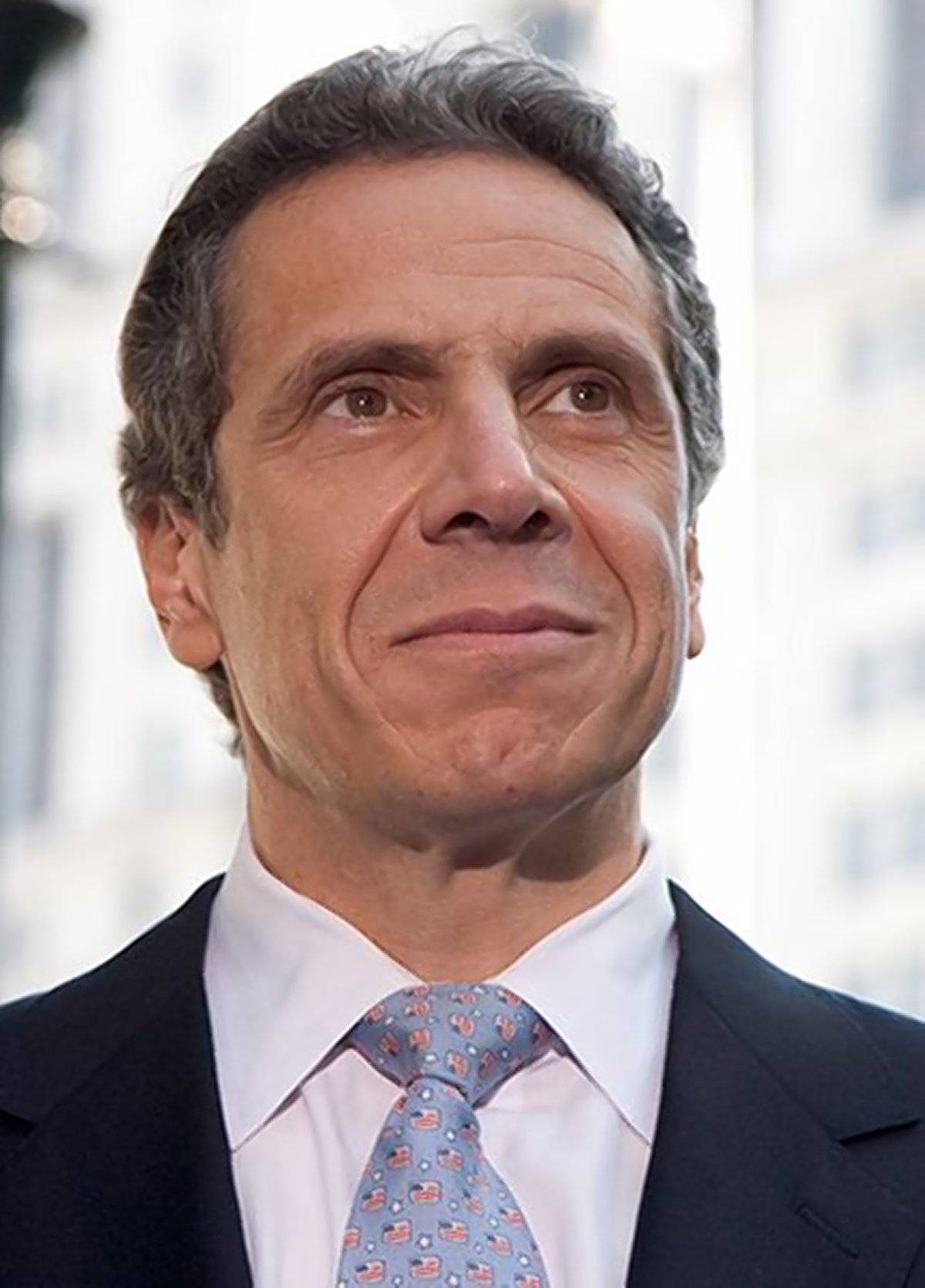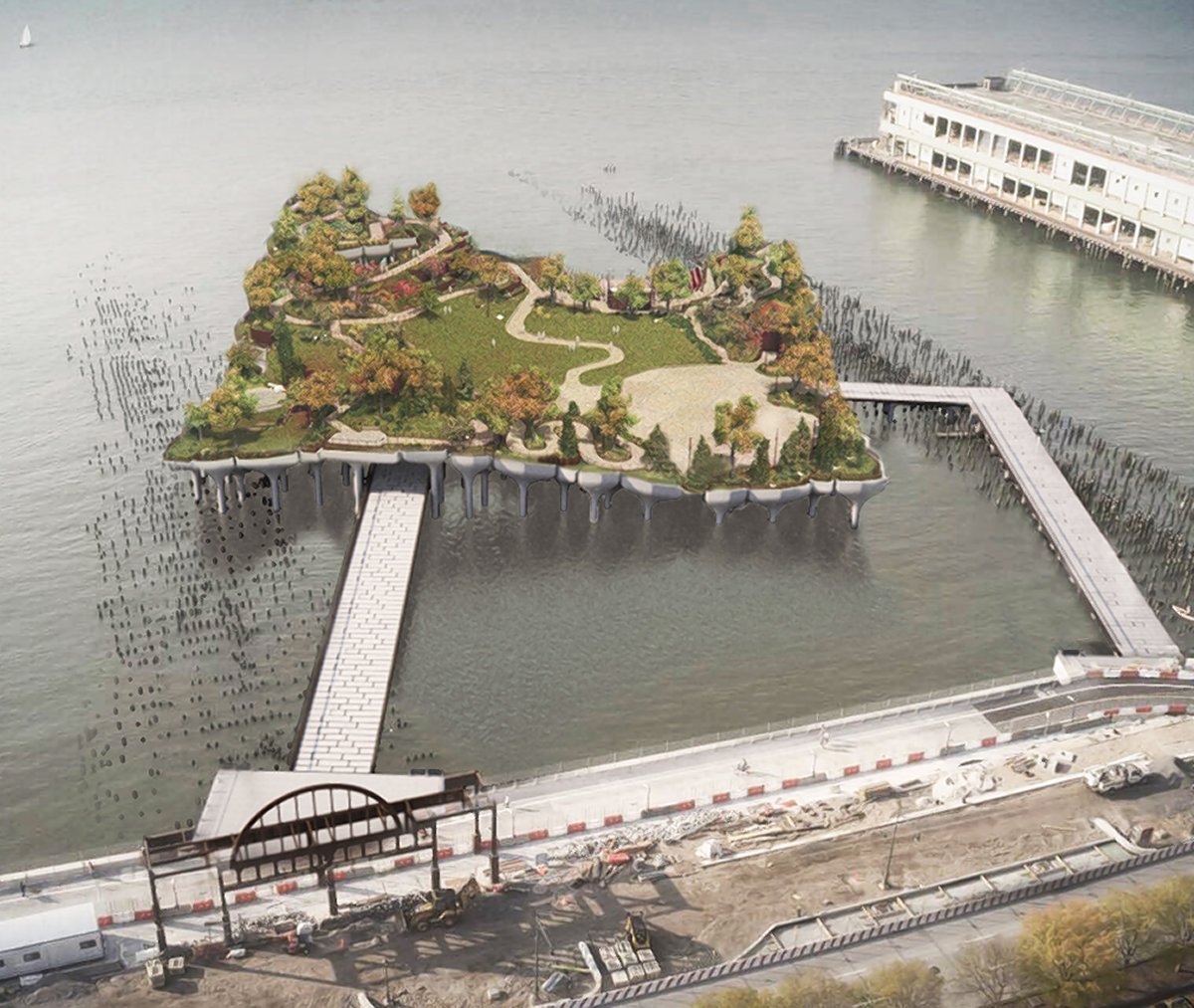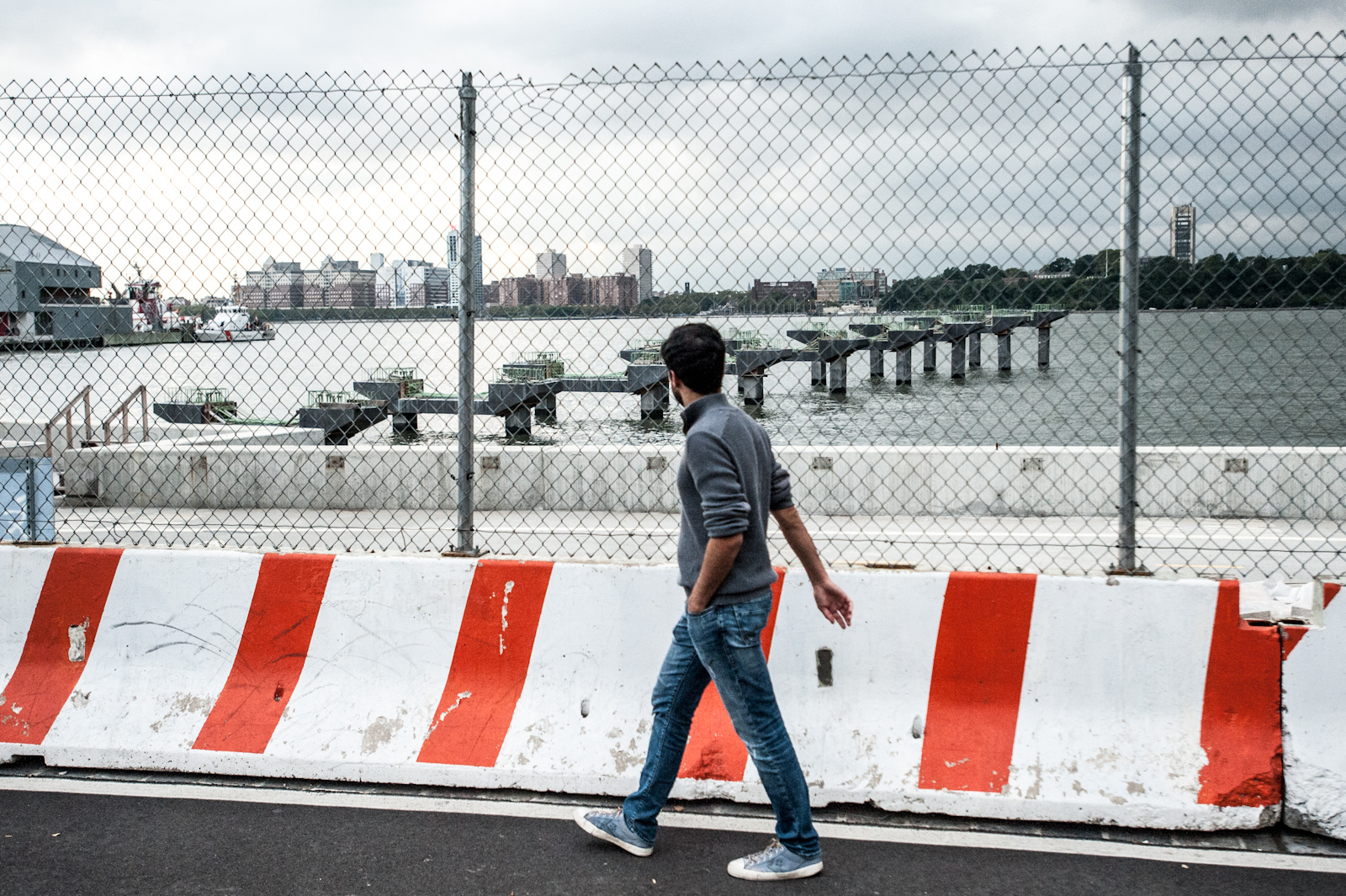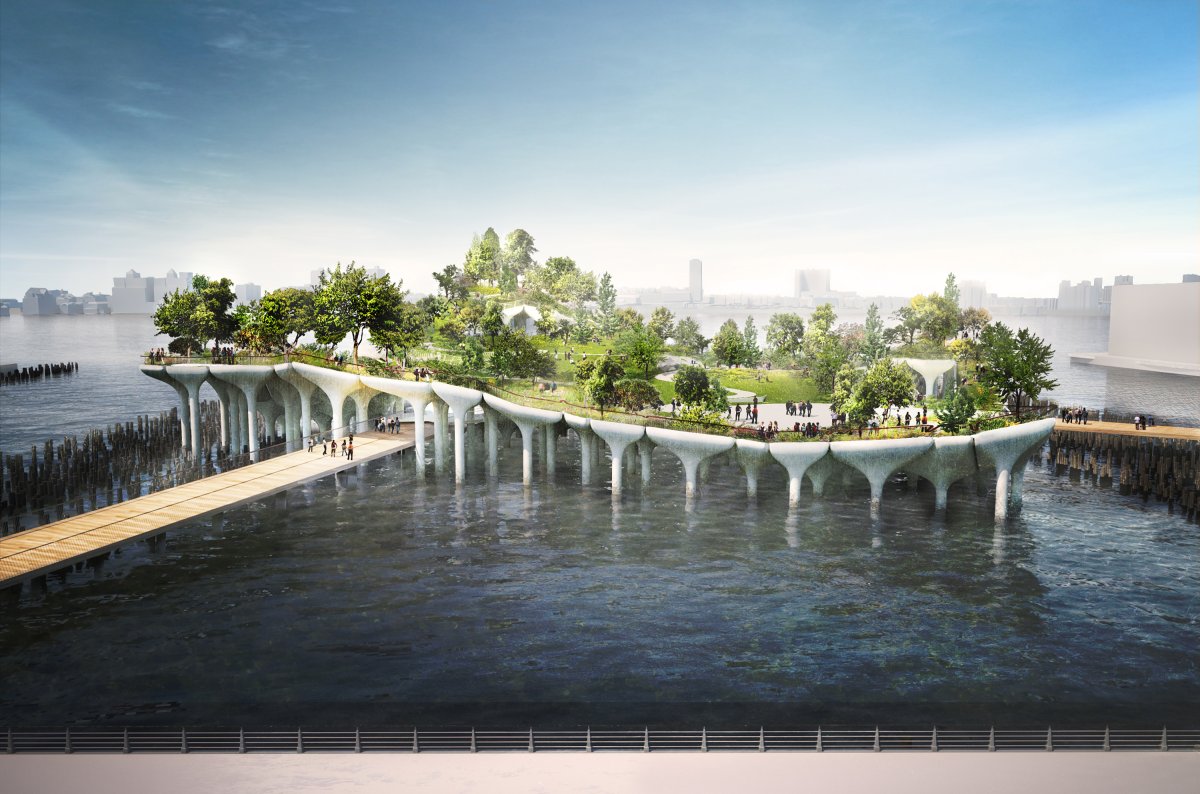
BY LINCOLN ANDERSON | It looks like those forlorn “ghost trestles” sitting off W. 14th St. won’t be redeveloped as little fishing piers, after all, but will actually be used for the full-blown Pier 55.
Yes, “Diller Island” has risen from the depths — thanks to a huge, Poseidon-like helping hand from Andrew Cuomo.
A little more than a month ago, media mogul Barry Diller, the chairperson of IAC, shockingly pulled out of the Pier 55 project, saying that lawsuits filed by The City Club of New York against the scheme had escalated the plan’s costs, delayed the construction and were causing “continuing controversy.”
On Wednesday afternoon, however, the governor announced that the plan for Pier 55 — a 2.7-acre “arts fantasy island” that would “float” offshore on tall support piles — is now back on.
Cuomo also announced his commitment to finish the entire 4.5-mile-long Hudson River Park — which stretches from Chambers St. to 59th St. — within the next five years. It has been reported that $200 million is needed to finish the park, and the assumption is that the state would now provide a significant chunk of that cash.
Calling Pier 55 an “architecturally significant park” and a “spectacular addition to the waterfront,” Cuomo said the project’s scuttling last month was “a lost opportunity for all New Yorkers.”
“I have spoken to the parties involved in the lawsuit against Pier 55 and expressed my belief that cooperative efforts to complete the overall park are more constructive than litigation and stalemate,” Cuomo said in his statement. “I believe all parties have a higher goal and desire that the park should be completed, and can be completed, in the near future. It is my hope that if the people of the State of New York grant me an additional term of office, that the park should be completed in that time period.”
Cuomo plans to run for another four-year term in November 2018.
“I also expressed my belief,” the governor said, “that the opposition to Pier 55 was ultimately counterproductive, and that I would like to see a positive, constructive effort with all concerned parties moving forward.
“We have had productive conversations and it has been agreed that the legal dispute commenced by the City Club will cease, Pier 55 will go forward, and we will work cooperatively to complete the full vision for the park.
“Given the change in circumstances, I have asked Mr. Diller to consider proceeding with the Pier 55 project as his concept could be an important and lasting legacy. I know Mr. Diller’s intent was to create a space that would benefit future generations. I applaud his philanthropy and motives and believe the dream is still within his grasp.”
Before Diller threw in the towel last month, he and his wife, Diane von Furstenberg, had committed to largely financing the project, whose price tag had ballooned to $250 million, through their family foundation, while a Diller-led nonprofit, Pier55 Inc., was to program the pier with arts and entertainment for 20 years. This was all set down in a lease negotiated with the Hudson River Park Trust, the park’s governing state-city authority.

Diller pulled out of the project right as negotiations were wrapping up with the City Club, under which it was hoped a settlement would be reached to allow Pier 55 to move forward.
Wednesday’s announcement also included statements from Diller; Richard Emery, the City Club’s attorney; and developer Douglas Durst, who partially funded the club’s lawsuits.
Diller said everyone has been begging him not to abandon the project.
“In the last month, I have been the recipient of so much importuning, from so many people,” Diller said, “all with the same sentiment: They all express their hope that we not give up and instead find some way to proceed with building Pier 55. Letters, calls, e-mails, texts — and just walking the streets of New York — I have had countless people tell me how much they were looking forward to having this new pier, and how unfortunate were the circumstances of its cancellation. … So many people had worked for six years to create both the concept and the plans for the pier. In these last weeks, I began to think that we should not let it go, and that I would try to put aside the disappointments and difficulties of these last years.
“The governor has informed me that the City Club litigation will not be pursued if I go forward, and that is an important factor and welcome news.
“So,” Diller said, “I’m going to make one last attempt to revive the plans to build the park, so that the intended beneficiaries of our endeavor can fall in love with Pier 55 in the way all of us have. We’ll need to reinstate our agreements with the Hudson River Park Trust, with the state and federal agencies that had given us permits, our contractors, and we’ll need to know that the plaintiffs will not reinstate their litigation. And with all that, we’ll joyfully proceed.”
(For the record, many Villager readers have been calling and e-mailing the paper in recent weeks to say they have appreciated the paper’s ongoing coverage of the story, and were glad that the billionaire-funded project had sunk.)

The City Club has now indeed dropped its litigation against the project in return for the governor’s commitment to finish the park and protect the river’s marine environment.
“On behalf of the plaintiffs — City Club, Tom Fox and Rob Buchanan — the completion of Hudson River Park and the protection of the estuary have always been of utmost importance to the entire environmental, civic and preservation community,” attorney Emery said. “Today’s historic commitment by Governor Cuomo to finish the park and protect the estuary is a great victory for park users and all New Yorkers. In that spirit, we will not litigate against Pier 55 and will work with the governor to realize his visionary plan for completion of the Hudson River Park and for protection of the Hudson River.”
Still-uncompleted parts of the overall Hudson River Park include Pier 97, at W. 57th St. — which is just a raw concrete deck that needs to be landscaped; Pier 76, at W. 36th St. — half of which is supposed to be developed as a park; much of the “upland park” (non-pier) areas in Chelsea and Hell’s Kitchen; and Gansevoort Peninsula, between Little W. 12th and Gansevoort Sts.
Durst is a former chairperson of Friends of Hudson River Park, which today is the park’s main fundraising group, but had a falling out with the Trust, which is building and operates the park.
On Wednesday, Durst praised Cuomo for brokering the deal.
“My goal has always been the completion of the park and the protection of the Hudson River,” Durst said. “Today’s agreement is a major step in that direction. I applaud the governor for his leadership, vision and achievements in rebuilding New York State and his commitment to Hudson River Park.”
No Trust officials’ statements were included on the governor’s press release. According to a source, that’s because they were not involved in brokering the agreement. Neither did Mayor de Blasio have a statement on the press release.
In response to a request for comment from The Villager, the Trust provided one from Diana Taylor, chairperson of the Trust’s board of directors.
“After more than six years of painstaking hard work,” Taylor said, “it was a tragedy for the public that the project was canceled last month. We will work with all stakeholders to figure out a way forward and bring this incredible project to fruition.”
Fox, one of the City Club plaintiffs, told The Villager he was not at liberty to speak much about the developments, though he offered one succinct and heartfelt on-the-record comment.
“I’m very much looking forward,” Fox said, “to working with the governor to assist in the completion of the Hudson River Park, which I initially started working on with his father, Governor Mario Cuomo, in 1986.”
According to a source, there is technically no settlement document now, like the one the City Club was previously working on with the Trust and Diller’s representatives. Everything that was in that document is actually contained in the original Hudson River Park Act of 1998, the source said, such as provisions for areas for historic ships to moor; “soft edges” — marshes and wetlands — in spots along the park; and a prohibition against building new non-water-dependent uses in the Hudson River estuarine sanctuary.

The entire Hudson River Park was originally slated to be completed more than a dozen years ago — by 2003.
As Diller indicated in his statement, they will now have to go back and redo their lease with the Trust, and new permits will be needed from the U.S. Army Corps of Engineers and the state Department of Environmental Conservation for the in-water work.
Tobi Bergman, a former chairperson of Community Board 2 and a longtime waterfront park activist, was happy at the announcement. C.B. 2 supported “Diller Island.”
“Good news,” Bergman said, “and if the result of the lawsuit is getting the park completed more quickly, all the better.”































